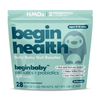Babies Are Missing This Critical Gut Bacteria
share this article

In the first months of life, a baby’s gut plays a major role in building immunity, digesting human milk, and laying the foundation for lifelong health. But a growing number of babies in the U.S. are lacking a critical gut bacteria meant to dominate the infant microbiome: Bifidobacterium longum subsp. infantis (B. infantis).
This isn’t just a biological detail because iit has real health implications. Missing B. infantis can impact gut development, immune health, stooling, and risks of inflammation. Here’s what parents should know and how you can help seed your baby’s gut with the good microbes they need.
What Is B. infantis and Why It Matters
B. infantis is a beneficial bacteria commonly passed from mother to baby during vaginal birth and breastfeeding. It naturally dominates a healthy infant gut, especially when breastfed, and thrives by feeding on human milk oligosaccharides (HMOs) - complex sugars only bacteria, not babies, can digest.
When B. infantis is present, it helps:
-
Support a healthy immune system
-
Strengthen the gut barrier
-
Reduce inflammation
-
Promote soft, regular stools
-
Inhibit harmful pathogens from taking hold
The Problem: It’s Disappearing in U.S. Infants
A landmark 2025 Communications Biology study surveyed 412 U.S. infants and found an alarming result: about 25% had no detectable Bifidobacterium species in their gut microbiome, with B. infantis present in just 8% of infants [1].
That’s a dramatic loss compared to historical norms, with potential consequences including disrupted digestion, higher eczema or allergy risk, and weakened immune development.
Why It's Becoming Rare in Industrialized Settings
Several modern factors contribute to the decline of this critical microbe:
-
Cesarean births limit maternal microbial transfer
-
Antibiotic use during delivery or postpartum
-
Formula feeding, often lacking HMOs to support B. infantis
-
Generational microbiome loss, reducing maternal transmission [2]
As a result, babies in industrialized countries are losing gut bacteria once considered foundational to early life health.
How to Seed B. infantis in Your Baby’s Gut
Even if your baby didn’t receive B. infantis naturally, you can support its colonization through targeted interventions:
1. Choose a probiotic with B. infantis
Look for products specifically containing B. infantis, as most generic probiotics do not. Pairing it with the prebiotic 2'-FL HMO (a key sugar in breast milk) has been shown to support colonization and effectiveness [3].
Try: Beginbaby Prebiotic + Probiotics—a daily powder that includes B. infantis, B. lactis, and 2’-FL HMO to help support gut microbiome development from Day 1, even in formula-fed or C-section-delivered babies.
2. Support breastfeeding or choose HMO-fortified formula
Breast milk naturally contains HMOs that feed B. infantis. If breastfeeding isn’t an option, look for infant formulas supplemented with 2’-FL HMO to better mimic the gut-nourishing effects of breast milk.
3. Use antibiotics only when truly needed
Avoid overuse of antibiotics during and after birth unless medically necessary. Work with your pediatrician to support the gut microbiome before and after treatment if antibiotics are required.
Summary
B. infantis plays a vital role in early gut and immune development—but many modern babies are missing out. Whether due to birth method, feeding choices, or medical intervention, it’s no longer a given. By choosing targeted probiotics, breastfeeding or HMO-enriched formula, and thoughtful antibiotic use, you can help bring this foundational microbe back into your baby’s gut for a healthier start in life.
















